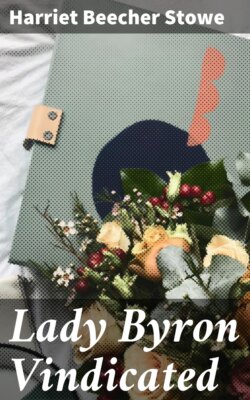Читать книгу Lady Byron Vindicated - Гарриет Бичер-Стоу - Страница 7
На сайте Литреса книга снята с продажи.
Оглавление'The fact is, the work had been copied for the private reading of a great lady in Florence.'
The note says:—
'The great lady in Florence, for whose private reading Byron's autobiography was copied, was the Countess of Westmoreland. … Lady Blessington had the autobiography in her possession for weeks, and confessed to having copied every line of it. Moore remonstrated, and she committed her copy to the flames, but did not tell him that her sister, Mrs. Home Purvis, now Viscountess of Canterbury, had also made a copy! … From the quantity of copy I have seen—and others were more in the way of falling in with it than myself—I surmise that at least half a dozen copies were made, and of these five are now in existence. Some particular parts, such as the marriage and separation, were copied separately; but I think there cannot be less than five full copies yet to be found.'
This was written after the original autobiography was burned.
We may see the zeal and enthusiasm of the Byron party—copying seventy-eight folio sheets, as of old Christians copied the Gospels. How widely, fully, and thoroughly, thus, by this secret process, was society saturated with Byron's own versions of the story that related to himself and wife! Against her there was only the complaint of an absolute silence. She put forth no statements, no documents; had no party, sealed the lips of her counsel, and even of her servants; yet she could not but have known, from time to time, how thoroughly and strongly this web of mingled truth and lies was being meshed around her steps.
From the time that Byron first saw the importance of securing Wilson on his side, and wrote to have his partisans attend to him, we may date an entire revolution in the 'Blackwood.' It became Byron's warmest supporter—is to this day the bitterest accuser of his wife.
Why was this wonderful silence? It appears by Dr. Lushington's statements, that, when Lady Byron did speak, she had a story to tell that powerfully affected both him and Romilly—a story supported by evidence on which they were willing to have gone to public trial. Supposing, now, she had imitated Lord Byron's example, and, avoiding public trial, had put her story into private circulation; as he sent 'Don Juan' to fifty confidential friends, suppose she had sent a written statement of her story to fifty judges as intelligent as the two that had heard it; or suppose she had confronted his autobiography with her own—what would have been the result?
The first result might have been Mrs. Leigh's utter ruin. The world may finally forgive the man of genius anything; but for a woman there is no mercy and no redemption.
This ruin Lady Byron prevented by her utter silence and great self-command. Mrs. Leigh never lost position. Lady Byron never so varied in her manner towards her as to excite the suspicions even of her confidential old servant.
To protect Mrs. Leigh effectually, it must have been necessary to continue to exclude even her own mother from the secret, as we are assured she did at first; for, had she told Lady Milbanke, it is not possible that so high-spirited a woman could have restrained herself from such outward expressions as would at least have awakened suspicion. There was no resource but this absolute silence.
Lady Blessington, in her last conversation with Lord Byron, thus describes the life Lady Byron was leading. She speaks of her as 'wearing away her youth in almost monastic seclusion, questioned by some, appreciated by few, seeking consolation alone in the discharge of her duties, and avoiding all external demonstrations of a grief that her pale cheek and solitary existence alone were vouchers for.'[16]
The main object of all this silence may be imagined, if we remember that if Lord Byron had not died—had he truly and deeply repented, and become a thoroughly good man, and returned to England to pursue a course worthy of his powers, there was on record neither word nor deed from his wife to stand in his way.
His place was kept in society, ready for him to return to whenever he came clothed and in his right mind. He might have had the heart and confidence of his daughter unshadowed by a suspicion. He might have won the reverence of the great and good in his own lands and all lands. That hope, which was the strong support, the prayer of the silent wife, it did not please God to fulfil.
Lord Byron died a worn-out man at thirty-six. But the bitter seeds he had sown came up, after his death, in a harvest of thorns over his grave; and there were not wanting hands to use them as instruments of torture on the heart of his widow.
